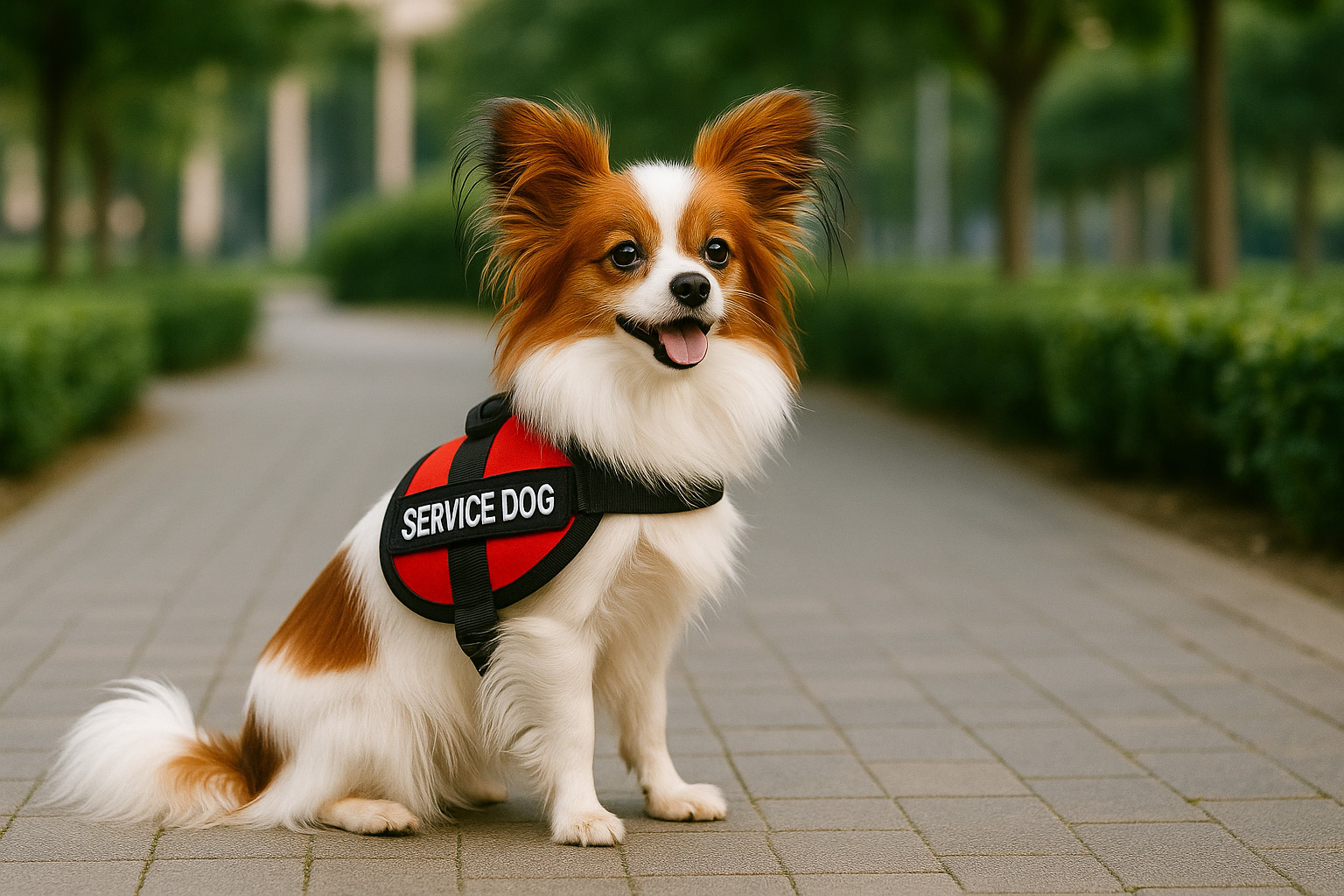Papillon as a Service Dog
Get Your Documents

The Papillon, with its distinctive butterfly-like ears and lively personality, is a unique breed that can offer a surprising amount of value when utilized as a service dog. Though traditionally seen as companion animals, their intelligence and adaptability make them suitable for certain types of service work. This article will examine the breed’s physical characteristics, temperament, suitability for service work, and health considerations to help determine if the Papillon is a good fit for specific service roles.
Papillon Overview
Papillons, also known as Continental Toy Spaniels, are a toy breed known for their elegant appearance and vibrant nature. Despite their small stature, they possess a robust constitution and an eagerness to participate in various activities. While they are not the most obvious choice for a service dog due to their size, Papillons boast several traits that can make them effective in particular service roles.
Physical Characteristics
Papillons are small and lightweight, generally weighing between 4 to 9 pounds and standing 8 to 11 inches tall at the shoulder. Their most recognizable feature is their large, fringed butterfly-like ears, which give the breed its name – “papillon” being French for “butterfly.”
- Size and Portability: The Papillon’s small size makes them easy to carry and transport, which can be beneficial for individuals who require a service dog but have space constraints or mobility issues.
- Agility and Movement: Despite their size, Papillons are incredibly agile and energetic. They can move quickly and navigate tight spaces, which can be advantageous in crowded environments.
- Energy Levels: Papillons have high energy levels and need regular exercise to maintain their physical and mental well-being. They thrive on active engagement and physical activities that keep their sprightly spirits high.
Temperament and Attitude
Papillons are known for their bright and friendly personalities. Their keen intelligence and sociable nature allow them to form strong bonds with their handlers, which is crucial for any service dog.
- Intelligence: Papillons are among the most intelligent dog breeds, ranking high for their learning capacity and problem-solving skills. This intelligence makes them extraordinarily trainable, a key factor in their capability as service dogs.
- Sociability and Affection: Papillons form strong attachments to their handlers, exhibiting a high level of loyalty and affection. They enjoy being close to their humans and often thrive on engaging in interactive tasks.
- Alertness and Sensitivity: The breed is highly alert and sensitive to their environment. They are quick to notice changes or potential threats, traits that can be advantageous for tasks such as medical alert or psychiatric assistance.
Types of Service Work
While Papillons are not commonly associated with traditional service tasks requiring physical strength, they excel in areas where their intelligence, alertness, and bond with their handler are critical.
- Medical Alert Service: Papillons can be trained to detect and alert to medical conditions such as diabetes or seizures. Their acute senses and strong focus on their handlers make them well-suited for this role.
- Psychiatric Service Dogs: They can assist individuals with psychiatric conditions, such as anxiety or PTSD, by providing tactile stimulation or interrupting behaviors that may lead to panic attacks or stress-related issues.
- Emotional Support Animals: While not service dogs per se, Papillons can be excellent emotional support animals due to their empathetic nature and close bonds with their owners. They provide comfort and companionship that can significantly benefit individuals experiencing emotional distress.
Health Considerations
As with all breeds, Papillons come with their own set of health considerations that can impact their effectiveness as service dogs.
- Dental Issues: Due to their small size, Papillons are prone to dental problems, requiring regular veterinary check-ups and dental care to prevent complications.
- Patellar Luxation: This is a condition common in smaller breeds where the kneecap dislocates from its normal position, which could affect their mobility and, consequently, their ability to perform certain tasks.
- Progressive Retinal Atrophy (PRA): This genetic condition leads to a gradual loss of vision, potentially impacting their effectiveness in roles requiring acute visual cues.
- Lifespan and Longevity: A generally healthy Papillon has a longer lifespan compared to larger breeds, averaging 14 to 16 years, allowing for a longer working life if health issues are managed properly.
Training and Suitability
Papillons are highly trainable and respond well to positive reinforcement techniques. However, their sensitive nature requires a gentle yet consistent approach to training.
- Trainability: Thanks to their intelligence and eagerness to please, Papillons can quickly learn commands and tasks essential for service work. Consistent, rewards-based training can harness their natural abilities and drive.
- Sensitivity: It’s important to consider their tendency to be sensitive to harsh discipline or negative environments, which could hinder their training process. A calm, patient, and positive training regimen is optimal.
- Socialization: Early socialization is crucial to help them adapt to various environments and situations they might encounter during service work.
Summary of Papillon
In conclusion, while Papillons may not fit the mold of typical service dogs due to their size, they possess many qualities that make them suitable for specific, less physically demanding roles.
- Intelligence: High intelligence and learning capacity contribute to effective training outcomes.
- Alertness: Their sensitivity and alert nature make them adept at medical alert and psychiatric task assistance.
- Size: Their small, portable size suits individuals needing a less cumbersome service animal.
- Health Considerations: Potential health issues require proactive management but are manageable given proper care.
- Lifespan: Longevity supports an extended period of service, assuming good health.
Ultimately, Papillons are ideal candidates for roles such as medical alert or psychiatric service animals, where their intelligence, loyalty, and alertness can be fully leveraged to benefit their handlers. As always, individual suitability must be evaluated based on the dog’s personality, health status, and the specific needs of the handler.
Get Your Documents
Example State Cards













